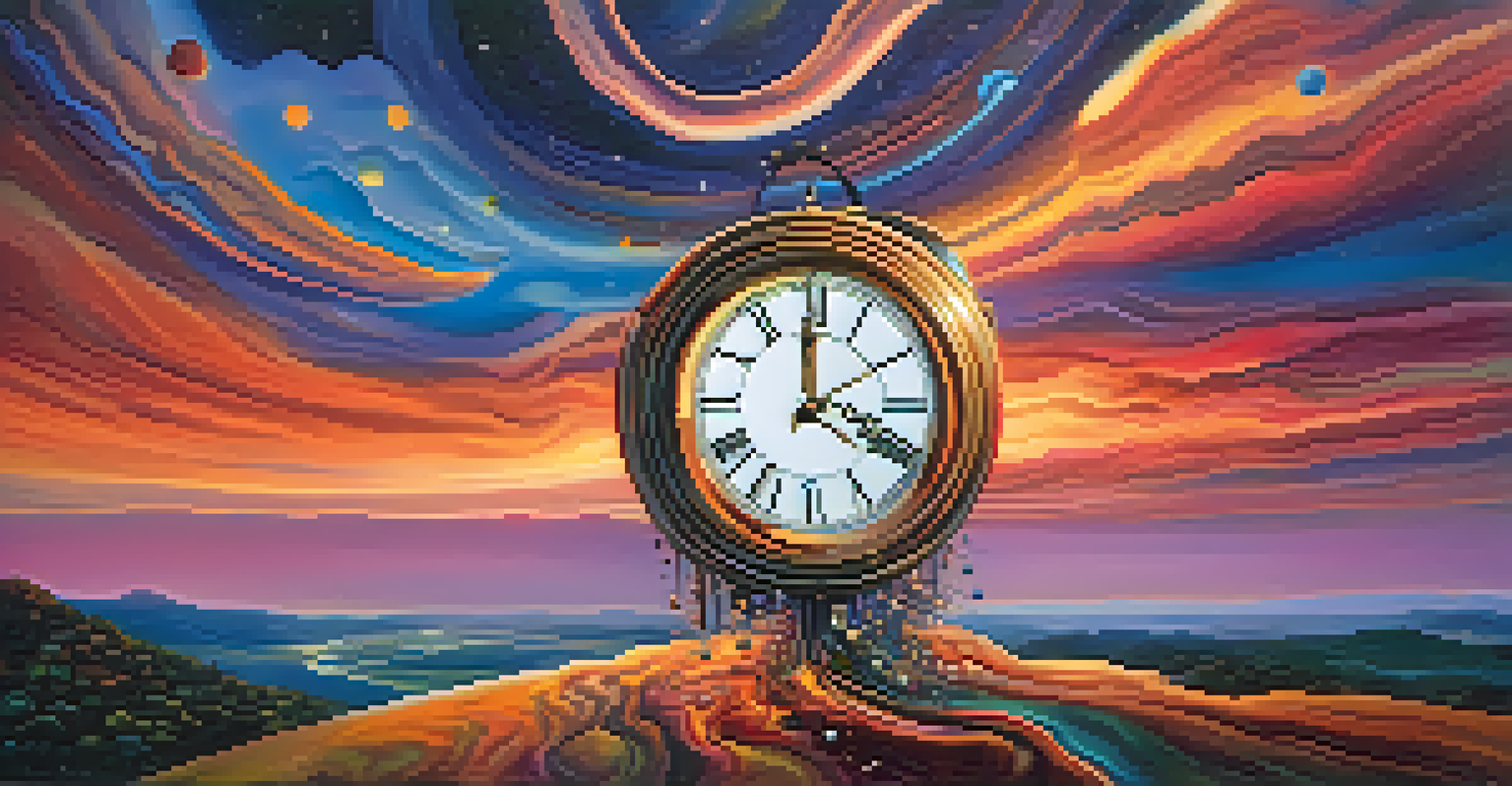Psychedelics and the Concept of Time: A Philosophical Dive

Understanding the Basics of Psychedelics and Time Perception
Psychedelics are substances that can profoundly alter consciousness, often leading to unique experiences of time. Common examples include substances like LSD, psilocybin mushrooms, and ayahuasca. These experiences can distort our usual understanding of time, making moments feel elongated or compressed.
The mind is everything. What you think you become.
When under the influence of psychedelics, many report a feeling that time has stopped or that they are experiencing time in a nonlinear fashion. This can lead to a sense of timelessness, where past, present, and future seem to blend together. Such shifts in perception can challenge our everyday understanding of how we experience time.
Philosophically, this raises intriguing questions about the nature of time itself. Is time a rigid framework that governs our lives, or is it more malleable, influenced by our consciousness? Exploring these questions can deepen our understanding of both time and the mind.
Historical Context: Psychedelics and Temporal Experience
Throughout history, various cultures have used psychedelics in spiritual and ceremonial contexts, often leading to altered perceptions of reality and time. Indigenous peoples, for example, have utilized plant medicines for centuries to connect with the divine, often describing experiences that transcend ordinary time. These practices highlight a longstanding relationship between psychedelics and our understanding of temporal existence.

Notable thinkers and philosophers, such as Aldous Huxley and Terence McKenna, have also explored the connections between psychedelics and time. They argue that these substances can unlock deeper states of consciousness, allowing individuals to perceive time in ways that are not possible in sober states. This historical lens adds depth to our understanding of how psychedelics have shaped human thought about time.
Psychedelics Alter Time Perception
Psychedelics can create experiences where time feels distorted, leading individuals to perceive moments as either elongated or compressed.
This legacy invites us to consider how contemporary use of psychedelics might continue to influence our views on time. As we re-examine these substances in light of modern science, we can uncover more profound insights into how our perception of time may be deeply intertwined with our experiences.
The Science Behind Psychedelics and Temporal Distortion
Recent research has begun to unravel the neurological mechanisms behind the psychedelic experience, particularly concerning time perception. Studies suggest that psychedelics can alter brain connectivity, leading to a state where the usual boundaries of time become blurred. This neurological shift can result in the experience of 'time dilation'—where time seems to slow down.
Time is an illusion. Lunchtime doubly so.
For instance, individuals report that a single moment can feel like it lasts for hours, allowing for deep introspection and emotional processing. This phenomenon can lead to significant personal insights and a feeling of connectedness with the universe. By understanding these scientific underpinnings, we can appreciate how psychedelics impact our perception of time.
Moreover, these findings challenge the conventional view of time as a constant, suggesting it may be more subjective than we once believed. As we delve deeper into this research, we may find new ways to understand human consciousness and its relationship with time.
Philosophical Implications of Altered Time Perception
The experience of time under psychedelics invites us to question the very nature of reality and existence. If time can be perceived differently, how does that affect our understanding of the past and future? Philosophers like Henri Bergson have argued that time is not merely a series of moments but rather a fluid, experiential phenomenon.
This idea suggests that our emotional and psychological states can influence how we experience time. Psychedelic experiences may help us access a more profound understanding of ourselves and our place in the universe, prompting reflection on how we live our lives. By examining these philosophical implications, we can gain insight into the relationship between consciousness and time.
Historical Use Influences Understanding
Various cultures historically utilized psychedelics in spiritual contexts, shaping our understanding of time and consciousness.
Ultimately, this invites us to consider how the mind shapes our experience of reality. The ability to experience time differently may offer opportunities for healing, growth, and transformation.
Psychedelics, Time, and the Concept of Flow
The concept of 'flow' refers to a state where individuals are fully immersed in an activity, often losing track of time. This experience is frequently reported during psychedelic sessions, where users engage deeply with their thoughts and emotions. In such states, time seems to fade away, allowing for a profound sense of presence and connection.
This state of flow can lead to heightened creativity and problem-solving abilities, as the mind is free from the usual constraints of linear thinking. Many artists, musicians, and writers have turned to psychedelics to enhance their creative processes, finding that these substances allow them to tap into deeper wells of inspiration. This connection between psychedelics and flow offers a fascinating lens through which to view creative endeavors.
By examining the relationship between psychedelics, time, and flow, we can explore how altered states of consciousness may foster innovation and artistic expression. This interplay encourages us to reconsider how we approach creativity in our everyday lives.
The Role of Intention in Psychedelic Experiences
Intention plays a critical role in shaping the psychedelic experience, particularly regarding time perception. When individuals approach psychedelics with a clear purpose—be it healing, exploration, or creativity—they often report more profound shifts in their experience of time. This underscores the idea that our mindset can significantly influence our experiences.
For example, someone seeking insight into their past may find that their experience of time allows for deep reflection and understanding. In contrast, another individual approaching the experience casually may not experience the same depth of temporal distortion. This highlights the importance of setting intentions that align with one's goals and aspirations.
Intention Shapes Psychedelic Experiences
The mindset and intentions individuals bring to their psychedelic experiences significantly influence their perceptions of time.
By emphasizing the role of intention, we can better navigate psychedelic journeys and cultivate more meaningful interactions with time. This practice encourages a mindful approach to both psychedelics and personal growth.
Future Directions: Psychedelics and the Study of Time
As interest in psychedelics continues to grow, so does the potential for future research into their impact on time perception. Scientists are beginning to explore how these substances can not only alter individual experiences but also enhance our understanding of time itself. This may lead to new therapeutic approaches for mental health and well-being.
For instance, studies could investigate how psychedelics might help individuals process trauma by altering their perception of time, allowing for a different emotional engagement with past events. This could open doors to innovative treatments for conditions like PTSD, where time often feels frozen or stuck in painful memories.

Ultimately, the intersection of psychedelics and the concept of time holds exciting possibilities for future exploration. As we continue to study these substances, we may uncover new insights that reshape our understanding of consciousness and the human experience.